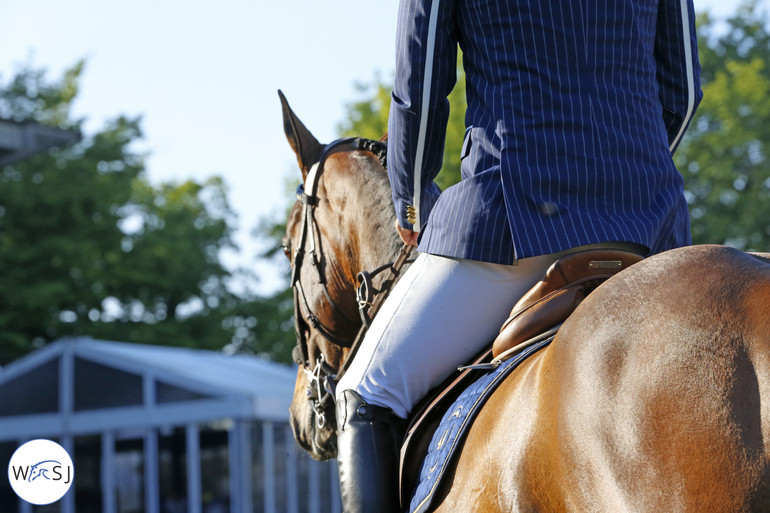Showjumpers at all levels have long recognized a relationship between confidence and performance. Sometimes it appears that only the greatest equestrians have access to this magical power, as if it were an inborn privilege, while other inferior beings can only wish for it. Fortunately, this is quite wrong! Confidence is just another trainable skill. Everyone can increase their level of confidence, perform better, and feel better about themselves too.
Although many people struggle in defining confidence, it is usually described as thoughts, feelings and actions reflecting belief and positive expectations. In a chapter I published for a national sports organization, I defined confidence as “all the thoughts, feelings, actions and sensations reflecting self-belief and expectations of success.”
Thoughts
Confident showjumpers entertain a rich variety of successful thoughts, and do so often. The notion of failure rarely occurs during training, imagery sessions or competition. Much preparation and reflection goes into ensuring that thoughts are productive and positive, but it is just as important a habit to master as any physical skill.
Feelings
Confident jumpers believe deeply in their abilities, love the challenge of a new or difficult course and feel strongly that they will overcome obstacles and prevail. Just as important as positive thoughts, positive emotions must be developed and maintained through proper mental training.
Actions
Confident jumpers not only expect success and feel it, but they also display their confidence actively in their facial expressions and body language. The horse picks up on many subtle rider behaviors, so it is doubly important to be consistently positive in actions. Those who do it right rarely send their horse any feelings of hesitation or doubt by acting indecisive, discouraged or threatened.
It is often asked what comes first, confidence or success? Although it is true that success breeds confidence, and success is indeed the greatest source of confidence by far, it is equally true that confidence increases one’s probability for success. Success is never certain, but self-doubt, negativity, and low expectations guarantee failure.
Belief in oneself, and one’s horse, prevents harmful distractions such as anxiety, allowing for a more efficient performance focus. Confidence also adds security during difficult periods and helps the jumper remain positive and sustain effort. Finally, self-belief prompts jumpers to set higher performance goals, as greater achievements are more likely to be expected and appear more attainable.
Equestrians who lack confidence worry needlessly about mistakes, lose concentration more easily, allow dangerous levels of arousal to intrude and hasten failure. After all, there is less to gain by trying if expectations are not positive.
Although confidence is a critical mental skill desired by all, there is no replacement for competence. The most confident jumper in the world still needs technical expertise and experience to succeed. Confidence just helps everything go more smoothly, often providing that decisive competitive edge. I’m always thrilled when a trainer realizes this and calls me to help. I stay clear of offering technical advice, deferring to the greater expertise of the trainer, but find there’s always tons to do in my area of expertise in the mental realm.
Some describe the relationship between confidence and performance as an inverted U, similar to the relationship between arousal and performance. Maintaining an optimal level of confidence is important because overconfidence, or a false belief in one’s ability, can lead to reduced effort and performance. In all sports, and showjumping is no exception, there is that ideal mix of confidence and modesty that leads to superb effort and reduced fear. I’ve found that a bit of modesty helps guard against pressure and increases flow.
Here are some strategies to help you develop and maintain confidence for showjumping:
- Frequently imagine successful performances. I provide guided imagery sessions on the phone with clients, and encourage them to do this on their own too in between our sessions.
- Increase your level of physical fitness, as this will enhance your technique and self-image at the same time!
- Don’t only enter the huge events. Find smaller competitions or go to training shows that allow you to experience more winning if needed in order to keep confidence alive. Some jumpers never learn to win or develop confidence because they are always entering big shows with larger fields and avoiding smaller events where chances are better for success.
- Make a nice rich list of your strengths. Review this list regularly to remind yourself of how great you really are and how good your horse is too!
- Eliminate negative thoughts and memories. When they occur, replace them with positive self-statements (e.g., “I’m at my best under pressure”).
- Review the course well and have a terrific strategy going into each competition. Confidence will grow as your plan is executed.
- Maintain positive body language regardless of how you are feeling prior to or during the course. The way you act influences the way you and your horse feel. Act confidently, be confident!
- Frequently improve on areas of weakness in practice so that you’ll have more to believe in during competition.
Solid and consistent effort invested in self-belief and confidence will help you reach your potential in showjumping. Confidence is not a luxury reserved for the divine, just another mental tool for success…compliments of sport psychology. Believe in yourself and prosper!
Dr. John F. Murray, a licensed clinical psychologist and sport psychologist in Palm Beach, Florida for the past 17 years, was recently called “best in the business” by Psychology Today, USA Today and Metro New York. He is a well-known author and leader in his field with a Ph.D. in Clinical Psychology and Masters degrees both in Clinical Psychology and Sports Psychology/Exercise & Sport Sciences from the University of Florida. He maintains a web site at http://www.johnfmurray.com and provides phone or skype evaluations and mental coaching to athletes worldwide, including show jumpers. He may be reached for questions at: 561-596-9898 or by email at: [email protected]










